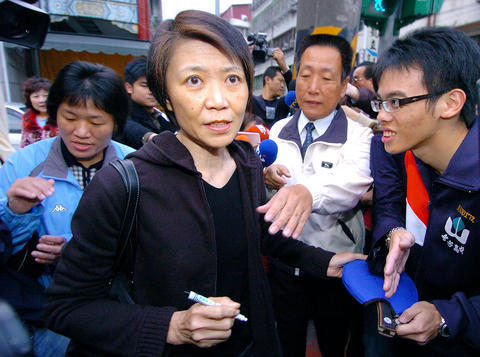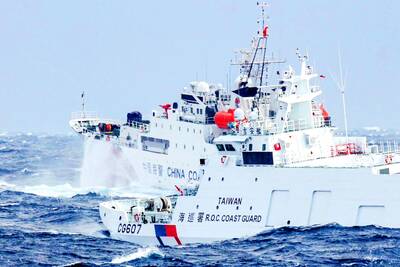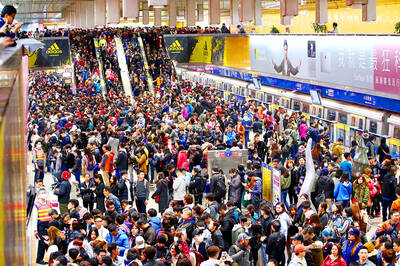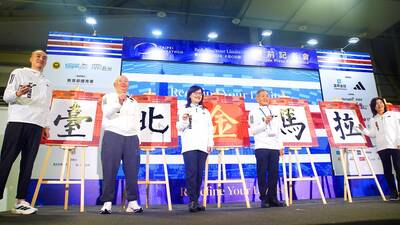Chow Mei-ching (
Frequently photographed in a black shirt and blue jeans with no makeup, Chow has shunned the limelight and insisted on going about her normal life ever since Ma entered politics.
Chow has worked as a lawyer for Mega International Commercial Bank for more than 20 years and seldom accompanied Ma to public functions.

Even after her husband won the presidency on March 22, Chow kept a low-profile and went to work by bus the following Monday.
"Please don't call me the president's wife. I am department director Chow," she told reporters who followed her onto the bus earlier last week, turning on her MP3 player and ignoring their inquiries.
On Tuesday, Chow said in a written statement that she would continue working as the head of the legal department of the government-controlled bank, defending her right to work amid debate over whether she should leave her job following her husband's inauguration on May 20.
"My work involves providing legal advice to the bank and does not include banking management, the company's operations or decision-making," Chow said in the statement. "It's impossible for me to be involved in the transfer of benefits."
Chow said she would consider leaving the bank if her work adversely affects the bank's reputation or its operations, or if her workload poses a negative impact on her duties as first lady.
Some political observers are not convinced, however, saying that by working for a state-run company, she was bound to run into situations where a conflict of interest may arise.
If Chow stays on the job after Ma is sworn in as president, she would be the first president's wife in Taiwan to have a separate career.
Ma's spokesman, Wang Yu-chi (
Married to one of the nation's most popular politicians, Chow has tried hard to avoid publicity and protect her privacy. Often confronted by a barrage of reporters and camera crews waiting in front of her apartment, she quietly goes her way, saying nothing but "thank you" to most questions.
Even when faced with allegations of insider trading and stealing newspapers while studying at Harvard, Chow defended herself only through written statements.
Unlike her public image of the poker-faced, "cool Mrs. Ma," Chow is a lovely approachable person in private, Wang said.
"Mrs. Ma is nothing like what you see on TV. She is friendly and thoughtful, and the campaign staff all like her a lot," he said.
Chen Yi-ling (
Chen recalled that during the campaign tour, Chow memorized all of the staff names on the first day and offered to help them with the luggage or prepare food for lunch and dinner.
"She was easygoing and attentive. I think she is more approachable than Mr. Ma," she said.
Although Chow did not stump for Ma until the final days of election campaign, she showed her support for her husband with her signature gesture: greeting voters by grasping both of their hands and doing a 90-degree bow.
Chen said Chow suffered from lower back pain but insisted on doing the 90-degree bow when greeting voters as a way to express her sincerity. However, some local cable news channels found fault with the gesture, saying Chow lacked sincerity because she did not look at people directly in the eyes when she shook hands with them.
As a lawyer, Chow has helped Ma prepare for debates during the two Taipei mayoral contests and the presidential race.
Ma expressed his gratitude for Chow's help before a mayoral debate when seeking a second term.
"However, sometimes she can be a tough sergeant," Ma said at the time, adding jokingly that "the biggest source of pressure for me is not my opponent, but my wife."
Commenting on Chow's decision to continue working while first lady, Shih Cheng-feng (
"She has ignored the fact that she is no longer an ordinary person. As the first lady, she should sacrifice her rights and focus her efforts on assisting the president," he said.
Women's rights groups agreed that Chow should avoid any potential conflict of interest, but extended their support for Chow to keep working while first lady.

READY: The CGA said it closely monitored China’s maritime exercise, deployed vessels to shadow the Chinese ships one-on-one and set up emergency response centers Chinese navy and coast guard ships have returned to China, signaling the end of a massive maritime exercise, authorities said yesterday. The Coast Guard Administration (CGA) released images it said showed Chinese vessels sailing north in rough seas past Taiwan on Thursday, on their way to China. “All the Chinese coast guard went back to China yesterday, so although they have not officially made any announcement, we consider it over,” CGA Deputy Director-General Hsieh Ching-chin (謝慶欽) said. Beijing has not confirmed the drills and the Chinese Ministry of National Defense did not say whether the maneuvers had taken place when asked at a

People can take the Taipei MRT free of charge if they access it at Nanjing Sanmin Station or Taipei Arena Station on the Green Line between 12am and 6am on Jan. 1, the Taipei Department of Transportation said on Friday, outlining its plans to ease crowding during New Year’s events in the capital. More than 200,000 people are expected to attend New Year’s Eve events in Taipei, with singer A-mei (張惠妹) performing at the Taipei Dome and the city government’s New Year’s Eve party at Taipei City Hall Plaza, the department said. As people have tended to use the MRT’s Blue or

PUBLIC TRANSPORT: As some roads would be fully or partially closed, people are advised to take the MRT, with services expanded to accommodate more riders This year’s Taipei Marathon, which has obtained its first gold label certification from World Athletics, is to be held from 5am to 1pm tomorrow and would have 28,000 participants. The race is to start from the Taipei City Plaza and would go through major roads throughout the city, with traffic control implemented from 6am to 2pm, officials said. The Taipei Mass Rapid Transit (MRT) system and New Taipei City MRT Circle line would start operating at 5am on the day of the race, they said. The race would cover Renai Road, Xinyi Road, Hangzhou S Road, Aiguo east and west roads,

Taipei is participating in Osaka’s Festival of Lights this year, with a 3m-tall bubble tea light installation symbolizing Taiwan’s bubble tea culture. The installation is designed as a bubble tea cup and features illustrations of Taipei’s iconic landmarks, such as Taipei 101, the Red House and North Gate, as well as soup dumplings and the matchmaking deity the Old Man Under the Moon (月下老人), affectionately known as Yue Lao (月老). Taipei and Osaka have collaborated closely on tourism and culture since Taipei first participated in the festival in 2018, the Taipei City Department of Information and Tourism said. In February, Osaka represented